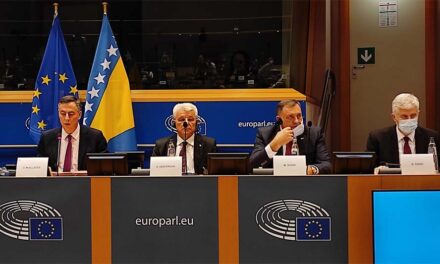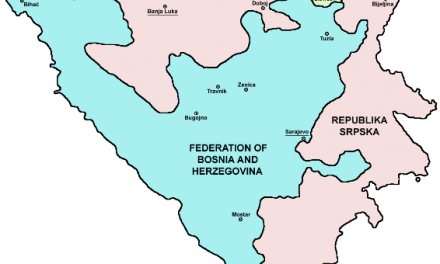Republic of Srpska (RS), a party to the treaties that make up the 1995 Dayton Peace Accords and one of the two autonomous Entities that make up Bosnia and Herzegovina (BiH), is pleased to submit this 31st Report to the UN Security Council.
In Part I of the report, the RS once again emphasizes its commitment to the Dayton Accords, which have successfully ensured peace between BiH’s three formerly warring constituent peoples— Bosniaks, Serbs, and Croats—for more than 28 years. This includes a commitment to BiH’s constitutional order as well as its sovereignty and territorial integrity. It also includes an unshakable commitment to BiH’s continued peace. The RS, moreover, is committed to seeing that the Dayton Accords—including BiH’s federal constitutional structure and its democratic system for enacting laws—are faithfully implemented.
Part II outlines the rapid progress BiH’s multiethnic leadership has made recently on BiH’s EU integration and highlights key steps necessary for BiH to advance on the EU path. The RS welcomes the European Council’s decision to recognize this progress by approving the beginning of BiH’s EU membership negotiations, and it reiterates the RS’s strong support for BiH’s EU integration. Part II also explains why BiH’s federal constitutional structure is not only consistent with EU requirements but is also important for Europe’s security.
Moreover, Part II emphasizes that with BiH beginning EU accession negotiations, it is long past time to restore BiH’s sovereignty and democratic self-government by closing the Office of the High Representative (OHR). As the EU has made clear, the presence of a foreigner claiming—without any legal basis—unlimited despotic powers over BiH is antithetical to BiH’s EU path. It is also past time, Part II explains, to replace the foreign judges on the BiH Constitutional Court with judges who are BiH citizens, a reform the European Commission has identified among its 14 key priorities for BiH’s EU integration.
In Part III, the RS examines efforts by the retired German politician who claims to be High Representative, Christian Schmidt, along with his supporters, to sabotage BiH’s political progress and EU integration. Just five days after the European Council decided to open accession talks with the EU, Mr. Schmidt, willfully acting against the EU’s clearly expressed objections, issued an illegal edict purporting to enact 114 amendments to the BiH Election Law. Knowing that his dictatorial powers are utterly incompatible with BiH’s EU path, and having watched BiH’s multiethnic governing partners prove how much they could accomplish on their own, Mr. Schmidt purposely created a political crisis to derail BiH’s EU integration and provide him with an argument that BiH does not deserve sovereignty or to be governed by its own democratic institutions.
Part III also explains how Mr. Schmidt has also been persecuting citizens through a “statute” he imposed that establishes prison sentences for public officials who refuse to cooperate with his illegal decrees. In a lawless attempt to overthrow a democratically elected leader, BiH officials— acting under pressure from Mr. Schmidt—indicted RS President Milorad Dodik based on Mr. Schmidt’s counterfeit new criminal statute.
Finally, Part III examines how certain countries, in contradiction to their expressions of support for BiH’s EU aspirations, have been undermining BiH’s political stability and sabotaging its EU integration through constant interference in BiH’s internal affairs. For example:
- The United States publicly broke with the EU by condemning and trying to torpedo recent constructive political agreements among the leaders of BiH’s Serb, Bosniak, and Croat political parties.
- Some supposed friends of BiH also have continued to support Mr. Schmidt’s lawless and destabilizing dictatorship over BiH.
- The OSCE Mission in BiH, which has never criticized Schmidt’s unconstitutional and anti democratic rule over BiH, attacked the RS over its Election Law legislation, despite the fact that the legislation does not intrude at al on the BiH level’s constitutional jurisdiction.
- The US Embassy earlier this year tried to bully judicial and law enforcement authorities into investigating RS citizens for their participation in the RS Day parade, a celebration of the RS’s birthday.
- Germany and other critics of the RS sponsored a destabilizing anti-Serb resolution in the UN General Assembly, knowing that certain BiH officials’ expressions of BiH’s support for the resolution are fraudulent and flagrantly violate the BiH Constitution, which entrusts foreign policy to the collective Presidency.
- The United States, acting without the required permission of the BiH Presidency, even flew a pair of fighter jets over BiH on the eve of the parade as a menacing threat of potential military action against the RS.
All of these acts of interference in BiH’s internal affairs are destructive to BiH’s future prospects for EU membership and success as a country.












